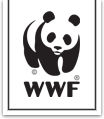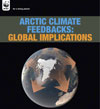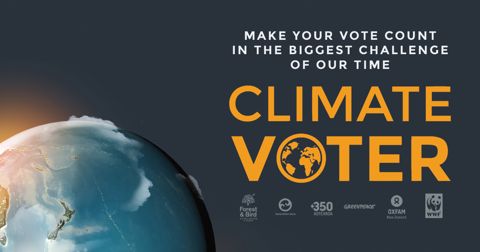A non-partisan campaign to put action on climate change at the centre of the coming election campaign was launched at the weekend (NZ Herald, RNZ). Climate Voter, a joint initiative by Forest & Bird, Generation Zero, 350 Aoteoroa, Greenpeace, Oxfam and WWF, is using social media to drive the campaign, and will host a debate on climate policy between the leaders of the top six polling parties in September. At the time of writing over 10,000 people had signed up to the campaign — including me. It’s a very worthwhile effort and one I’m very happy to support, because as long as politicians are allowed to get away with mismanaging or ignoring climate policy, NZ will remain on the wrong path. The laws of physics don’t care what your politics are, but they will make people who ignore them pay a high price.
Tag: WWF
20 years on, NZ’s Rio response inadequate: WWF
 The WWF report this week on how New Zealand has handled its responsibilities since the first Earth Summit 20 years ago is damning on the matter of greenhouse gas emissions. We have failed to measure up to our undertakings given back in 1992 and again in 2002. New Zealand signed up to the United Nations Framework Convention on Climate Change on the first day of the that Rio meeting, and subsequently ratified it. We committed in Article 4 to:
The WWF report this week on how New Zealand has handled its responsibilities since the first Earth Summit 20 years ago is damning on the matter of greenhouse gas emissions. We have failed to measure up to our undertakings given back in 1992 and again in 2002. New Zealand signed up to the United Nations Framework Convention on Climate Change on the first day of the that Rio meeting, and subsequently ratified it. We committed in Article 4 to:
“Adopt national policies and take corresponding measures on the mitigation of climate change, by limiting its anthropogenic emissions of greenhouse gases and protecting and enhancing its greenhouse gas sinks and reservoirs. These policies and measures will demonstrate that developed countries are taking the lead.”
The WWF report points out that nothing happened here for the next fourteen years and the country’s greenhouse gas emissions continued to increase. They flattened off after 2007, but that was mainly due to a major drought affecting agriculture and then the subsequent recession. The report considers the Emissions Trading Scheme enacted in 2008 and weakened in 2009 has had limited impact on emissions.
We have clearly failed to set emissions on a downward trajectory.
Continue reading “20 years on, NZ’s Rio response inadequate: WWF”
The Climate Show #7: Box and Boxsters – the cryosphere special
[youtube]kDr12nyuD04[/youtube]
Highlight of this week’s show is a fascinating — and sobering — interview with Greenland expert Professor Jason Box. His perspective on current events in the Arctic — from the dangers of permafrost methane, through rapid warming over Greenland and the potential impacts on sea level is essential listening and viewing. And he can surf, too. Glenn and Gareth discuss warm weather in New Zealand during a La Niña summer, drought in the Amazon and the complex interactions between climate and weather extremes, food production and political stability. John Cook from Skeptical Science debunks the favourite sceptic arguments about ice at both poles, and in the solutions segment we discuss the recent WWF report on renewable energy, and the new all-electric Porsche Boxster.
Watch The Climate Show on our Youtube channel, subscribe to the podcast via iTunes, or listen direct/download here:
Follow The Climate Show at The Climate Show web site, on Facebook and Twitter.
Show notes below the fold.
Continue reading “The Climate Show #7: Box and Boxsters – the cryosphere special”
More than a metre
 Sea level will rise by more than a metre by 2100 according to the authors of the third chapter in the World Wide Fund for Nature’s new Arctic report, introduced by Gareth a few days ago. Eric Rignot, one of the two authors of the chapter, is principal scientist for the Radar Science and Engineering Section at NASA’s Jet Propulsion Laboratory, Pasadena, Calif. The other author, Anny Cazenave, is an internationally renowned research scientist from France’s national centre for space studies.
Sea level will rise by more than a metre by 2100 according to the authors of the third chapter in the World Wide Fund for Nature’s new Arctic report, introduced by Gareth a few days ago. Eric Rignot, one of the two authors of the chapter, is principal scientist for the Radar Science and Engineering Section at NASA’s Jet Propulsion Laboratory, Pasadena, Calif. The other author, Anny Cazenave, is an internationally renowned research scientist from France’s national centre for space studies.
The value of the chapter is that it draws together, authoritatively and coherently, the evidence that points to considerably more sea-level rise over this century than projected in the 2007 IPCC Fourth Report (AR4). Happily politicians are taking IPCC reports much more seriously than in the past, but they should not rest on them. Their responsibility is to be up to date with what the science is saying now. The WWF report assesses the most recent science, and finds that the impacts of warming will be more severe than indicated by the IPCC.
What follows is a summary of the main points made by the chapter.
(Arctic) Change is now
 The World Wide Fund for Nature (WWF) has just published a new report on climate change in the Arctic — Arctic Climate Feedbacks: Global Implications [PDF], and it’s a fascinating read. Over the last two years I’ve blogged regularly on the changes being seen in the Arctic — sea ice reductions, melting of the Greenland ice sheet, the danger of increased carbon release from permafrost and sea floor methane hydrates, and the possible impacts on northern hemisphere weather patterns and climate. WWF’s report — written by some of the leading names in the field (including Serreze, Stroeve, Cazenave, Rignot, Canadell, and for the methane hydrate chapter Shakhova and Semiletov) — pulls together all those strands to paint a picture of a region undergoing rapid change. The authors provide a fully-referenced review of our current understanding of the processes at work as the pole warms, with chapters covering atmospheric circulation feedbacks, ocean circulation changes, ice sheets and sea level, marine and land carbon cycle feedbacks, and sea floor methane hydrates. It’s compelling stuff, and well worth reading in full, but for this post I want to focus on the excellent overview of methane hydrate feedbacks provided by Natalia Shakhova and Igor Semiletov.
The World Wide Fund for Nature (WWF) has just published a new report on climate change in the Arctic — Arctic Climate Feedbacks: Global Implications [PDF], and it’s a fascinating read. Over the last two years I’ve blogged regularly on the changes being seen in the Arctic — sea ice reductions, melting of the Greenland ice sheet, the danger of increased carbon release from permafrost and sea floor methane hydrates, and the possible impacts on northern hemisphere weather patterns and climate. WWF’s report — written by some of the leading names in the field (including Serreze, Stroeve, Cazenave, Rignot, Canadell, and for the methane hydrate chapter Shakhova and Semiletov) — pulls together all those strands to paint a picture of a region undergoing rapid change. The authors provide a fully-referenced review of our current understanding of the processes at work as the pole warms, with chapters covering atmospheric circulation feedbacks, ocean circulation changes, ice sheets and sea level, marine and land carbon cycle feedbacks, and sea floor methane hydrates. It’s compelling stuff, and well worth reading in full, but for this post I want to focus on the excellent overview of methane hydrate feedbacks provided by Natalia Shakhova and Igor Semiletov.

